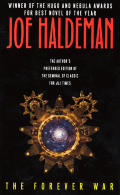
| Publisher: | Eos |
| Copyright: | September 1975 |
| Printing: | May 1991 |
| ISBN: | 0-380-70821-3 |
| Format: | Mass market |
| Pages: | 254 |
The version I read was the author's preferred version, with "You Can Never Go Back" as the central novella, which differs from the version originally serialized in Analog and published in the original paperback. I'm not sure when the preferred version was first assembled.
For some reason, I went into this book expecting a lot of gritty detail of the nature of ground combat in armored space suits. What I got instead was a rather clinical description of the feel of training and combat from the perspective of the disposable ground soldier, a description that felt rather uninteresting at the start until I realized that the detachment was really the core of the story.
How does one deal with being conscripted into the army, sent off to fight a war on false premises, severed completely from the world that one left, and swirled into a both endless and oddly brief series of mostly pointless encounters with pure boredom punctuated by extreme terror? I'm not sure that I've ever seen the cynical, sarcastic, bleak attitude of mixed fear and fatalism better done. With little, if any, truly hard-hitting emotional scenes and a main character who almost never lets deep feeling show, I ended up really feeling for him by the end of the book. The story ends up being evocative while the main character feels like he's trying hard not to be.
It took me a while to really start "getting" the feel of this book, because until the tone sinks in, it feels like a clinical description of disconnected events. I've found myself thinking more about it after I finished the book than while I was reading it, like the complete emotional impact takes a while to sink in.
The Forever War does suffer from a few of the standard problems with science fiction. The timescale is naively optimistic about space flight, a common failing, and some of the projections of the world's future seem very dated now. The central portion of the book, when Mandella tries to return to civilian life, is possibly the weakest just because the world he returns to is rather unbelievable. In a few places, this is bad enough to cause suspension of disbelief problems, although mostly discussion of specific technology is avoided. The foot soldier doesn't really care how it works, just whether it will, and how uncomfortable it's going to be.
I can't say that this book grabbed me and dragged me in, but it made a nice change of pace from world-sweeping fantasy, and it made me think. Recommended, with a note that you may find the emotional tone a bit odd at first.
Followed by Forever Free, but by all accounts I've seen it's a far weaker novel and not worth searching out.
Reviewed: 2004-03-29